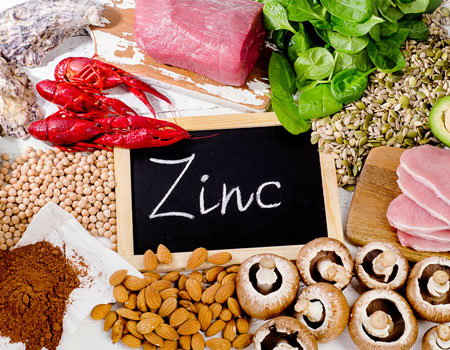3 Essential Vitamins for the Immune System
How Vitamins C, D and Zinc Support a Healthy Immune System

When it comes to vitamins for the immune system, making sure you receive the right nutrients is imperative for healthy immune function. Like the rest of your body, your immune system works better when you’re eating a variety of whole, nutritious foods. Knowing what vitamins support the immune system, and which foods contain what nutrients, is key. Below we discuss 3 essential vitamins for immune support and how to get more of them in your daily life.
(1) Vitamin C and the Immune System

If you’re feeling run down or have actually caught a cold, the most common advice Is to load up on vitamin C. And rightfully so. Multiple studies have shown that an extra dose of vitamin C can lower the severity and duration of a common cold.1
A powerful antioxidant, vitamin C strengthens your immune cells — giving your immune system a boost. According to immunologist and IMMUSE™ educational expert, Dr. Heather Moday, vitamin C accumulates in important white blood cells called neutrophils, making them more powerful eliminators of microbes.2
Vitamin C also helps boost your immune system by enhancing the production of cytokines, which are signaling molecules that regulate immunity and inflammation. Cytokine production increases the number and activity of critical immune cells, including natural killers (NK) cells, T cells and B cells.3,4
“Overall, vitamin C is famous for immune health for a reason. It’s incredibly important and can shorten the duration of infection as well as help your body recover from the inflammation caused by your immune response,” Dr. Moday says in her latest book, The Immunotype Breakthrough (2021).
For more vitamin C in your diet, load up on vitamin C-rich foods, like oranges, kiwis, kale, sweet potatoes and Brussel sprouts.
(2) Vitamin D and the Immune System

Although technically not an antioxidant (nor a vitamin for that matter), Dr. Moday argues that vitamin D is “the most important immune-modulating nutrient that exists,” explaining that the nutrient is actually a hormone. And an important one at that.
As Dr. Moday points out, all of the cells in your immune system have receptors for vitamin D — making the nutrient a true immunomodulator. Vitamin D not only enhances immune cell activity, helping your immune system function better, it regulates both the innate and adaptive immune responses.5,6
By stimulating innate immunity, vitamin D helps fortify your body’s first line of defenses. In an extensive review published in the BMJ , researchers found that vitamin D supplementation reduces the frequency and severity of upper respiratory tract infections, helping protect against the common cold. Additionally, vitamin D directly effects T cell activity, helping regulate adaptive immune responses and discourage autoimmune diseases.7
Unfortunately, according to data from 2022, vitamin D deficiency is more prevalent now than every before. In the United States, 35% of adults and about 60% of the elderly population are vitamin D deficient.8
The great news is that receiving mor vitamin D is as easy as going outside. Dr. Moday suggests at least 20 minutes of direct sunlight on your bare skin every day to ensure you’re getting enough vitamin D for the immune system.
(3) Zinc and the Immune System

Zinc is a critical micronutrient essential for immune function. In fact, researchers refer to the trace mineral as the “gatekeeper of the immune system” for the central role it plays in regulating the development and function of both the innate and adaptive immune systems.
In general, the cellular functions of innate and adaptive immune cells are dependent on zinc, which is involved in the production of cytokines, intracellular signaling and cell activation. In other words, zinc is crucial for the effectiveness of immune cells involved in innate and adaptive immunity.9,10
“For example, T and B cells don’t grow as well without adequate zinc, NK cells and macrophages kill much less effectively, and cytokine production is sluggish,” Dr. Moday explains. “Zinc also protects membranes from being attacked by free radicals, so it can counter the inflammation for day-to-day living and help with cleanup after attack by a pathogen.”
Researchers have been studying zinc’s ability to alter our susceptibility to infection for several decades. And a review published in The Journal of Family Practice, concluded that there is convincing evidence that taking zinc at the earliest signs of a common cold can significantly reduce the duration and severity of symptoms.
Want a surefire was to ramp up your intake of zinc? Eat more oysters, which have more than 10 times the amount of zinc than any other food.
Bonus Nutrient for Year-Round Immune Support
Together with eating a variety of nutritious foods, taking a daily postbiotic backed by clinical research can help support a healthy immune system.
Backed by science, IMMUSE™ (lc-plasma) is a cutting-edge postbiotic offering more comprehensive immune support than most traditional immune health ingredients. Clinical research shows that IMMUSE's unique mechanism of action helps get multiple immune cell types ready to perform their specialized roles in your body’s defense system — supporting year-round health when taken regularly.*
Better yet, IMMUSE postbiotic can be easily formulated into multi-ingredient immunity products containing more vitamins and minerals. Find immune support products containing IMMUSE by clicking the button below.
1Ran L, et. al. “Extra Dose of Vitamin C Based on a Daily Supplementation Shortens the Common Cold: A Meta-Analysis of 9 Randomized Controlled Trials.” Biomed Res Int. 2018 Jul 5: 1837634.
2Bozonet SM, et. al. “Enhanced Human Neutrophil Vitamin C Status, Chemotaxis and Oxidant Generation Following Dietary Supplementation with Vitamin C-Rich SunGold Kiwifruit.” Nutrients. 2015 Apr; 7(4): 2574–2588.
3 Peters C, et. al. “Vitamin C and Vitamin D—friends or foes in modulating γδ T-cell differentiation?” Cell Mol Immunol. 2022 July 7: 19, 1198–1200.
4 Heuser G and Vojdani A. “Enhancement of Natural Killer Cell Activity and T and B Cell Function by Buffered Vitamin C In Patients Exposed to Toxic Chemicals: The Role of Protein Kinase-C.” Immunopharmacol Immunotoxicol. 1997 Aug; 19(3): 291-312.
5 Kamen DL and Tangpricha V. “Vitamin D and molecular actions on the immune system: modulation of innate and autoimmunity.” J Mol Med (Berl). 2010 May; 88(5): 441–450.
6Hewison M. “Vitamin D and innate and adaptive immunity.” Vitam Horm. 2011; 86: 23-62.
7 Hahn J, et. al. “Vitamin D and marine omega 3 fatty acid supplementation and incident autoimmune disease: VITAL randomized controlled trial.” BMJ 2022; 376: e066452.
8Sizar O, et. al. “Vitamin D Deficiency.” Treasure Island (FL): StatPearls Publishing; 2023 Jan.
9Wessels I, et. al. “Zinc as a Gatekeeper of Immune Function.” Nutrients. 2017; 9(12): 1286.
10Shankar AH and Prasad AS. “Zinc and immune function: the biological basis of altered resistance to infection.” Am J Clin Nutr. 1998 Aug; 68(2 Suppl): 447S-463S.
